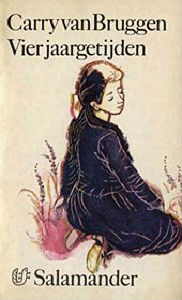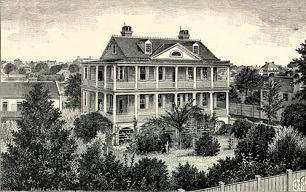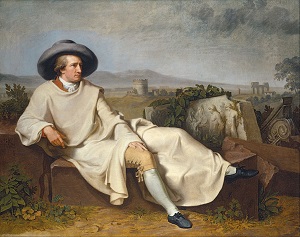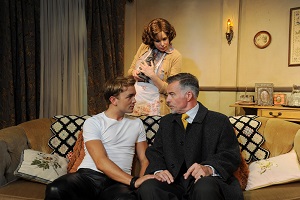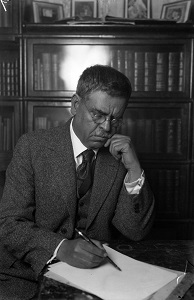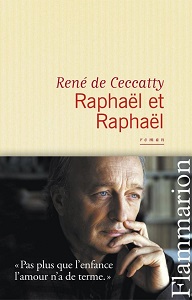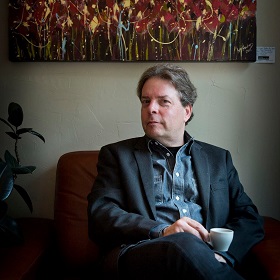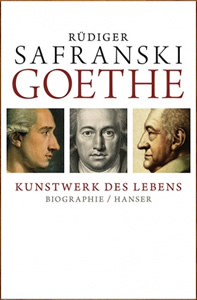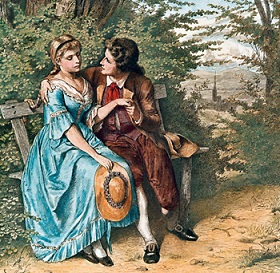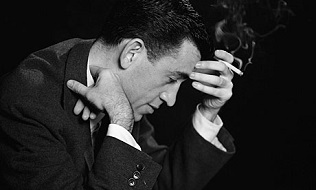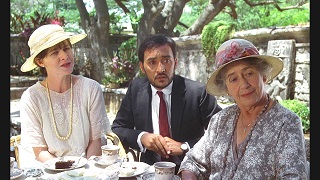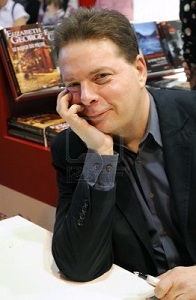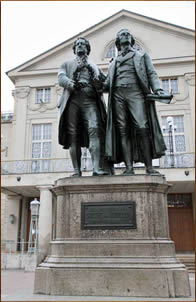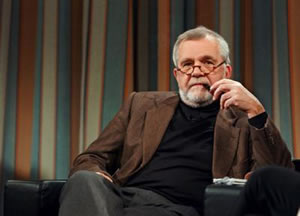De Engelse romanschrijver en essayist Edward Morgan Forster werd geboren op 1 januari 1879. Zie ook mijn blog van 1 januari 2007 en ook mijn blog van 1 januari 2008 en ook mijn blog van 1 januari 2009.
Uit: Howards End
„ONE MAY as well begin with Helen’s letters to her sister.
Howards End,
Tuesday.
Dearest Meg,
It isn’t going to be what we expected. It is old and little, and altogether delightful—red brick. We can scarcely pack in as it is, and the dear knows what will happen when Paul (younger son) arrives tomorrow. From hall you go right or left into dining-room or drawing-room. Hall itself is practically a room. You open another door in it, and there are the stairs going up in a sort of tunnel to the first-floor. Three bed-rooms in a row there, and three attics in a row above. That isn’t all the house really, but it’s all that one notices—nine windows as you look up from the front garden.
Then there’s a very big wych-elm—to the left as you look up—leaning a little over the house, and standing on the boundary between the garden and meadow. I quite love that tree already. Also ordinary elms, oaks—no nastier than ordinary oaks—pear-trees, apple-trees, and a vine. No silver birches, though. However, I must get on to my host and hostess. I only wanted to show that it isn’t the least what we expected. Why did we settle that their house would be all gables and wiggles, and their garden all gamboge-coloured paths? I believe simply because we associate them with expensive hotels—Mrs. Wilcox trailing in beautiful dresses down long corridors, Mr. Wilcox bullying porters, etc. We females are that unjust.
I shall be back Saturday; will let you know train later. They are as angry as I am that you did not come too; really Tibby is too tiresome, he starts a new mortal disease every month. How could he have got hay fever in London? and even if he could, it seems hard that you should give up a visit to hear a schoolboy sneeze. Tell him that Charles Wilcox (the son who is here) has hay fever too, but he’s brave, and gets quite cross when we inquire after it. Men like the Wilcoxes would do Tibby a power of good. But you won’t agree, and I’d better change the subject.
This long letter is because I’m writing before breakfast. Oh, the beautiful vine leaves! The house is covered with a vine. I looked out earlier, and Mrs. Wilcox was already in the garden. She evidently loves it. No wonder she sometimes looks tired. She was watching the large red poppies come out. Then she walked off the lawn to the meadow, whose corner to the right I can just see. Trail, trail, went her long dress over the sopping grass, and she came back with her hands full of the hay that was cut yesterday—I suppose for rabbits or something, as she kept on smelling it.“

Edward Morgan Forster (1 januari 1879 – 7 juni 1970)
De Amerikaanse schrijver Jerome David Salinger werd in New York geboren op 1 januari 1919. Zie ook mijn blog van 1 januari 2007 en ook mijn blog van 1 januari 2008 en ook mijn blog van 1 januari 2009.
Uit: The Catcher in the Rye
‘What?’ I said to old Phoebe. She said something to me, but I didn’t hear her.
‘You can’t even think of one thing.’
‘Yes, I can. Yes, I can.’
‘Well, do it, then.’
‘I like Allie,’ I said. ‘And I like doing what I’m doing right now. Sitting here with you, and talking, and thinking about stuff, and -‘
‘Allie’s dead. You always say that! If somebody’s dead and everything, and in Heaven, then it isn’t really -‘
‘I know he’s dead! Don’t you think I know that? I can still like him though, can’t I? Just because somebody’s dead, you don’t just stop liking them, for God’s sake – especially if they were about a thousand times nicer than the people you know that’re alive and all.’
Old Phoebe didn’t say anything. When she can’t think of anything to say, she doesn’t say a goddam word.
‘Anyway, I like it now,’ I said. ‘I mean right now. Sitting here with you and just chewing the fat and horsing -‘
‘That isn’t anything really!’
‘It is so something really! Certainly it is! Why the hell isn’t it? People never think anything is anything really. I’m getting goddam sick of it.’
‘Stop swearing. All right, name something else. Name something you’d like to be. Like a scientist. Or a lawyer or something.’
‘I couldn’t be a scientist. I’m no good in Science.’
‘Well, a lawyer – like Daddy and all.’
‘Lawyers are all right, I guess – but it doesn’t appeal to me,’ I said. ‘I mean they’re all right if they go around saving innocent guys’ lives all the time, and like that, but you don’t do that kind of stuff if you’re a lawyer. All you do is make a lot of dough and play golf and play bridge and buy cars and drink martinis and look like a hot-shot. And besides. Even if you did go around saving guys’ lives and all, how would you know if you did it because you really wanted to save guys’ lives, or you did it because what you really wanted to do was be a terrific lawyer, with everybody slapping you on the back and congratulating you in court when the goddam trial was over, the reporters and everybody, the way it is in the dirty movies? How would you know you weren’t being a phoney? The trouble is, you wouldn’t.’
I’m not too sure old Phoebe knew what the hell I was talking about. I mean she’s only a little child and all. But she was listening, at least. If somebody at least listens, it’s not too bad.
‘Daddy’s going to kill you. He’s going to kill you,’ she said.“
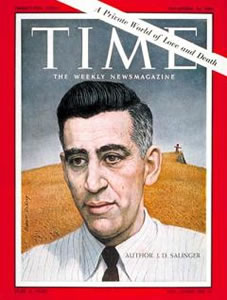
J.D. Salinger (New York, 1 januari 1919)
Cover Time van 15 september 1963
De Duitse schrijver en musicus Sven Regener werd geboren op 1 januari 1961 in Bremen. Zie ook mijn blog van 1 januari 2008 en ook mijn blog van 1 januari 2009.
Uit: Neue Vahr Süd
„1. HARRY Am letzten Tag, bevor er zur Bundeswehr mußte, war Frank Lehmann in keiner guten Stimmung. Es war der 30. Juni, ein Montag, und er hatte nichts zu tun, es gab nicht einmal irgendwelche Scheinaktivitäten, in die er sich hätte stürzen können, um seine Gedanken von der unausweichlichen Tatsache abzulenken, daß er sich am nächsten Tag in der Niedersachsen-Kaserne in Dörverden/Barme einzufinden hatte, um dort seinen Dienst als Soldat zu beginnen. Das schöne Wetter machte die Sache nicht besser, im Gegenteil, hätte es wenigstens geregnet, dann hätte er vielleicht zu Hause in seinem Zimmer bleiben können, wäre mit einem Buch und einer Tasse Tee auf seinem Bett liegengeblieben und hätte den Tag vergammelt, aber das ging bei schönem Wetter nicht.
Genau das impfen sie einem als kleinem Kind schon ein, dachte er, als er am Vormittag in seinem alten Opel Kadett sinnlos durch Bremen fuhr, daß man bei schönem Wetter auf keinen Fall zu Hause bleiben darf, das kriegt man nie wieder raus, dachte er, als er sich ein bißchen am Osterdeich ans Weserufer setzte und darauf wartete, daß ein Bockschiff vorbeikäme, dem er hinterherschauen konnte, dabei ergibt das für jemanden, der zwanzig Jahre alt ist und gerade ausgelernt hat, überhaupt keinen Sinn, bei schönem Wetter draußen herumzuhängen, dachte er, als er wieder im Auto saß und zurück in die Neue Vahr Süd fuhr, einem großen Neubauviertel im Osten von Bremen, wo er noch immer bei seinen Eltern wohnte, und das ist ja auch Quatsch, mit zwanzig noch bei seinen Eltern zu wohnen, dachte er, eigentlich ist das eine Schande, Manni wäre das nie passiert, dachte Frank und merkte wieder einmal, wie sehr ihm sein großer Bruder fehlte, seit der aus Bremen weg nach Berlin gegangen war. Mit Manni hätte er sich jetzt gerne unterhalten, Manni hätte irgendwas gesagt, das einen aufgemuntert hätte, dachte er, als er durch das Einkaufszentrum Berliner Freiheit schlenderte, Manni weiß immer irgendeinen Ausweg, oder jedenfalls sagt er immer etwas, das die Sache in einem anderen Licht darstellt, dachte er, oder er hat irgendeine Idee, obwohl er, was diese Bundeswehrsache betrifft, auch nur Quatschideen im Kopf hatte, dachte Frank, aber ich habe noch nicht einmal das, dachte er, bei mir reicht’s noch nicht einmal für Quatschideen, ich weiß noch nicht einmal, wie alles überhaupt so weit kommen konnte.“

Sven Regener (Bremen, 1 januari 1961)
De Nederlandse schrijfster Rascha Peper (pseudoniem van Jenneke Strijland) werd geboren op 1 januari 1949 in Driebergen. Peper studeerde Nederlandse taal- en letterkunde in Amsterdam. Na haar studie werkte ze enige tijd als lerares. Ze verhuisde in 1983 vanwege het werk van haar partner naar Wenen. Daar begon ze met schrijven. In 1990 debuteerde ze met de verhalenbundel De waterdame. Haar eerste roman, Oesters, verscheen in 1991. De roman Rico’s vleugels werd in 1994 genomineerd voor de AKO Literatuurprijs. In 1996 won ze de Multatuliprijs voor Russisch blauw. In het najaar van 1999 verhuisde Peper naar New York.
Uit: Russisch blauw
„Wensen? Nee, hoor, nee. Een bloeiende plant vond ze altijd leuk. Maar dat was niets bijzonders. Was er niet iets speciaals dat ze graag wilde hebben, een echt cadeau?
Het bleef even stil aan de andere kant. Dit waren moeilijke vragen voor zijn moeder.
‘Nou,’ zei ze toen, ‘nu je het vraagt: gisteren brak het handdoekenrekje in de keuken opeens af. Waar ik altijd de handdoek en theedoek aan heb hangen, weet je wel? Misschien is een nieuw han…’
‘Mamma!’ riep hij. ‘Als u een nieuw handdoekenrekje wilt hebben, dan breng ik dat met plezier een keer mee. Maar u denkt toch niet dat ik op uw zestigste verjaardag met een handdoekenrekje aan kom zetten.’
‘O, nee, nee…’ zei zijn moeder geschrokken. ‘Dan… dan moet je zelf maar wat bedenken, jongen. Ik vind alles leuk, hoor, gerust wel. Doe maar niet te veel moeite.’
Rascha Peper (Driebergen, 1 januari 1949)
De Amerikaanse schrijver Douglas Kennedy werd geboren op 1 januari 1955 in New York. Hij studeerde in Dublin en woont in Londen. Hij werkte onder andere als journalist voor The Sunday Times en Esquire en schreef hoorspelen voor de BBC. Zijn eerdere boeken waren thrillers, een ervan werd in vijftien talen vertaald. Met de The Pursuit of Happiness (2001) sloeg hij een nieuwe weg in. Er volgden o.a. A Special Relationship,State of the Union. The Woman in the Fifth en Leaving The World. In 2007 ontving hij de Franse onderscheiding Chevalier de l’Ordre des Arts et des Lettres. Zijn roman The Dead Heart was de basis voor de film Welcome to Woop Woop uit 1997.
Uit: State Of The Union
„AFTER HE WAS arrested, my father became famous.
It was 1966 – and Dad (or John Winthrop Latham, as he was known to everyone except his only child) was the first professor at the University of Vermont to speak out against the war in Vietnam. That spring, he headed a campus-wide protest that resulted in a sit-down demonstration outside the Administration Building. My dad led three hundred students as they peacefully blocked the entrance for thirty-six hours, bringing university executive business to a standstill. The police and National Guard were finally called. The protestors refused to move, and Dad was shown on national television being hauled off to jail.
It was big news at the time. Dad had instigated one of the first major exercises in student civil disobedience against the war and the image of this lone, venerable Yankee in a tweed jacket and a button-down Oxford blue shirt, being lifted off the ground by a couple of Vermont state troopers, made it on to newscasts around the country.
‘Your dad’s so cool!’ everybody told me at high school the morning after his arrest. Two years later, when I started my freshman year at the University of Vermont, even mentioning that I was Professor Latham’s daughter provoked the same response.
‘Your dad’s so cool!’ And I’d nod and smile tightly, and say, ‘Yeah, he’s the best.’
Don’t get me wrong, I adore my father. Always have, always will. But when you’re eighteen – as I was in ’69 – and you’re desperately trying to establish just the smallest sort of identity for yourself, and your dad has turned into the Tom Paine of both your home town and your college, you can easily find yourself dwarfed by his lanky, virtuous shadow.
I could have escaped his high moral profile by transferring to another school. Instead, in the middle of my sophomore year, I did the next best thing: I fell in love.
Dan Buchan was nothing like my father. Whereas Dad had the heavyduty WASP credentials – Choate, Princeton, then Harvard for his doctorate – Dan was from a nowhere town in upstate New York called Glens Falls. His father was a maintenance man in the local school system, his late mother had run a little manicure shop in town and Dan was the first member of his family to go to college at all, let alone medical school.“

Douglas Kennedy (New York, 1 januari 1955)
De Duitse schrijver en filosoof Rüdiger Safranski werd geboren op 1 januari 1945 in Rottweil. Zie ook mijn blog van 1 januari 2009.
Uit: Romantik
„Was man um 1800 die ›Romantische Schule‹ genannt hat, was sich um die Gebrüder Schlegel versammelte, was sich in deren kurzlebiger, aber heftiger Zeitschrift »Athenäum« selbstbewußt und bisweilen doktrinär zu Wort meldete, dieser entfesselte Spekulationsgeist des philosophischen Beginns von Fichte und Schelling, was in den frühen Erzählungen von Tieck und Wackenroder bezauberte als Vergangenheitssehnsucht und als neu erwachter Sinn für das Wunderbare, diese Hinneigung zur Nacht und zur poetischen Mystik bei Novalis, dieses Selbstgefühl des Neuanfangs, dieser beschwingte Geist einer jungen Generation, die zugleich gedankenschwer und verspielt auftrat, um den Impuls der Revolution in die Welt des Geistes und der Poesie zu tragen – diese ganze Bewegung hat selbstverständlich eine Vorgeschichte, einen Anfang vor dem Anfang.
Die jungen Leute, denen es nicht an Selbstbewußtsein mangelte, wollten einen neuen Anfang setzen, aber sie setzten doch auch fort, womit eine Generation früher der ›Sturm und Drang‹ begonnen hatte.
Johann Gottfried Herder, der deutsche Rousseau, hatte den Anstoß dazu gegeben. Und deshalb kann man die Geschichte der Romantik mit dem Augenblick beginnen lassen, da Herder 1769 zu einer Seereise nach Frankreich aufbrach, überstürzt und fluchtartig, überdrüssig der beengenden Lebensverhältnisse in Riga, wo sich der junge Prediger mit den Orthodoxen herumschlagen mußte und in ärgerliche literarische Fehden verwickelt war. Unterwegs kommen ihm Ideen, die nicht nur ihn beflügeln werden.
Herder sticht also in See. Hier beginnt unsere Reise auf den Spuren der Romantik und des Romantischen in der deutschen Kultur. Sie führt nach Berlin, Jena, Dresden, wo die Romantiker ihre Hauptquartiere aufgeschlagen hatten und wo sie das Feuerwerk ihrer Ideen abbrannten. Wo sie träumten, kritisierten und phantasierten.
Die Epoche der Romantik im engeren Sinne endet bei Eichendorff und E.T.A. Hoffmann, romantische Entfesselungskünstler und doch auch anderweitig gebunden. Der eine ein guter Katholik und Regierungsrat, der andere ein liberaler Kammergerichtsrat. Beides Doppelexistenzen, die nicht auf Romantik festgelegt sind. Eine kluge, eine lebbare Form der Romantik.“
Rüdiger Safranski (Rottweil, 1 januari 1945)
De Nederlandse schrijfster Carry van Bruggen (eig. Caroline Lea de Haan) werd geboren in Smilde op 1 januari 1881. Zie ook mijn blog van 1 januari 2009.
Uit: Palestina
„Nu zal het weldra weer een jaar geleden wezen, dat hij viel, Jacob Israël de Haan, mijn broer. Tot flauwe echo
’s zijn ze geworden, uit een verleden dat soms al ver lijkt, de vele betuigingen: hoe jammer het was dat hij zoo jong en zoo gewelddadig sterven moest. Het leek ook wel wreed en onnatuurlijk. Maar nu het zoo was…. waar is het onderscheid tusschen veertig en tachtig, tusschen niet meer te zijn en nooit geweest te zijn?
Dan, het gewelddadige van zijn einde. Ik heb dat toch al vrij gauw in harmonie met zijn leven kunnen voelen. Hij paste niet bij de menschen en daarom hebben ze hem uit hun midden, uit hun wereld verwijderd. Om twee dingen was het dat hij niet bij hen paste. Het eerste dat hij veel te veel gaf, het tweede dat hij veel te veel vorderde.
Nooit in mijn leven heb ik iemand gekend, in wien de ‘sense-of-property’ zoo volkomen ontbrak als in hem. De minste vleug, de flauwste schijn van liefde, vriendschap of maar wederzijdsche ingenomenheid was hem kostbaarder dan het kostbaarst bezit. Tot het scheppen, bevestigen, bestendigen van liefde, vriendschap of maar ingenomenheid zou hij zijn mooiste, zijn beste weggegeven hebben. Wilden we dat een geschenk, een boek, ook wezenlijk van hem zou zijn, dan schreven we erin: ‘Dit mag niet weggegeven worden.’ Niet om hem te dwingen het te behouden, maar om anderen te dwingen het af te wijzen! Zoo gaf hij zijn geld, zijn tijd, zijn nachtrust, zijn groote, vele talenten -, altijd meer aan menschen dan aan idealen, aan geïdealiseerde menschen, om met hen in die atmosfeer van liefde, vriendschap, toegenegenheid, die hem onontbeerlijk was, te mogen ademen. Tegen elke evidentie in, tegen beter weten in. Wat kunnen de menschen daarvan begrijpen? De menschen en de wereld van ‘Al te goed is buurmans gek’, van ‘Les bons comptes font les bons amis,’ van ‘Handel scheidt vriendschap’ en ‘Zaken vóór het meisje?’. Wij hoorden die dingen al in onze jeugd en ze deden ons beiden pijn, maar hij bleef ze loochenen metterdaad en leefde ertegen in. Hebben niet zijn felste vijanden zijn belangeloosheid luid geprezen? Dat hij werkte voor anderen en zelfs geen kosten vergoed wilde, toen hij nauwelijks leven kon. De volupteit van het geven werd verhoogd door de ontbering. Maar de wereld weet dat niet en zelfs de bevoordeelden, de begiftigden stoot het vaak af. Want het is immers niet ‘normaal’. Velen heeft hij vervreemd door te snel en te veel te willen geven.“

Carry van Bruggen (1 januari 1881 – 16 november 1932)
De Britse schrijver Joe Kingsley Orton werd geboren in Leicester op 1 januari 1933. Zie ook mijn blog van 1 januari 2009.
Uit: Leonie Orton Barnett on her brother Joe Orton (door Aleks Sierz)
„Did you always know that Joe was gay?
Oh no. I don’t think he was gay when he left Leicester [in 1951]. He’d only had very mild sexual experiences. There was that guy in the pictures [cinema] who was masturbating and all that. And there were the women that he met through the amateur dramatics. And he was really smitten with them. But women gave him a hard time. They didn’t take him seriously. To them, he was just a little boy. He was 16 and 17, but he looked younger.
Of course, he was looking for love. He was looking for somebody who was on his wavelength, and he found that in London. I think he really respected Kenneth. And I think that John Lahr makes the point that the idea was always that they would read and they would write together. They would get published. Or rather he, Kenneth, would get published. And he would be famous. And he would always have this pretty boyfriend. This pretty thing, Joe.
Joe was your Mum’s favourite?
Oh,
absolutely. Her first child. And she was much kinder to her boys than she was to her girls. That’s all standard for the time.
In Lahr’s book, it sounds like everybody hated Halliwell. Is that true?
No, it’s not. I just don’t know where he got that from. Because Peggy certainly never gave him that idea. Peggy always said about Kenneth, after Joe’s success, “Poor Kenneth, he fell behind.” And that’s a direct quote. And I suppose that [after Joe’s success] people didn’t want Kenneth. Joe had outgrown that life. That monkish existence that they lived in the early days, in the flat. He clearly left it behind, and then you see Kenneth became, as they say, the fly in the ointment.
Don’t forget that in the beginning Kenneth was Joe’s mainstay; Kenneth was the mentor. He said, “This is what we’re going to read; this is how we’re going to think,” you know. He taught him manners, he taught him mannerisms, he taught him all sorts of fundamental stuff that Joe wouldn’t have known. Joe wouldn’t have known how to socialise with people. But then Joe took to it like a fish to water and satirised it all. He challenged society’s fervently held moral values through satire, exploding myth after myth. So Peggy’s right in many ways. Poor Kenneth did fall behind. And then he was ill. And I think it is significant that Joe’s last play [What the Butler Saw] was set in a psychiatrist’s clinic. Poor Kenneth was in an absolute mess. He was taking anti-depressants, Mogadon to make him sleep. It’s a bit like Michael Jackson, isn’t it? Uppers and downers all over the place.“

Joe Orton (1 januari 1933 – 9 augustus 1967)
De Mexicaanse schrijver en medicus Mariano Azuela González werd geboren in Lagos de Moreno op 1 januari 1873. Azuela studeerde chirurgie aan de Universiteit van Guadalajara. Azuela is vooral bekend wegens zijn romans over de Mexicaanse Revolutie, die hij van dictbij meemaakte. Onder Francisco I. Madero was hij regionaal leider (jefe politico) van zijn geboortestreek en na Madero’s dood sloot hij zich aan bij de troepen van Pancho Villa, waar hij werkte als dokter. Na diens nederlaag zag hij zich gedwongen naar Texas te vluchten, waar hij Los de abajo (Engels: The Underdogs) schreef, zijn bekendste werk. In 1917 keerde hij terug naar Mexico en ging in Mexico-stad wonen, waar hij tot zijn dood in 1952 als dokter werkzaam bleef.
Uit: The Underdogs (Vertaald door E. Munguia jr.)
„That’s no animal, I tell you! . . . Listen to Palomo barking! It must be a human being.
The woman stared into the darkness of the sierra.
“What if they’re Federals?,” said a man who sat squatting and eating, a coarse earthenware plate in his right hand, three folded tortillas in the other.
The woman made no answer; all her senses were directed outside the hut.
The beat of horses’ hoofs rang in the quarry nearby. Palomo barked again, louder and more angrily.
“Well, Demetrio, I think you had better hide, all the same.”
Stolidly, the man finished eating; he reached for a water jug and gulped down the water in it. Then he stood up.
“Your rifle is under the mat,” she whispered.
A tallow candle illumined the small room. In one corner stood a plow, a yoke, a goad, and other agricultural implements. An old adobe mold hung by ropes from the roof and served as a bed; on it a child slept, covered with rags.
Demetrio buckled his cartridge belt about his waist and picked up his rifle. Tall and well built, with a sanguine, beardless face, he wore shirt and trousers of white cloth, a broad-brimmed straw hat, and leather sandals.
With slow, measured step, he left the room, vanishing into the impenetrable darkness of the night.
Palomo, excited to the point of fury, had jumped over the corral fence. Suddenly a shot rang out. The dog moaned, then barked no more.
Men on horseback rode up, shouting and swearing. Two of them dismounted, while the other hung back to watch the horses.
“Hey, there, woman, we want food! Eggs, milk, beans, anything you’ve got! We’re starving!”
“Damned sierra! It would take the Devil himself not to lose his way!”
“Sergeant, even the Devil would go astray if he were as drunk as you are.”
One of them wore chevrons on his shoulders, the other red stripes on his sleeves.
“Whose place is this, old woman? . . . What the . . . Isn’t anybody home?”
“What about that light and that child there? Look here, woman, we want to eat, and damn quick, too! Are you coming out, or are we going to make you?”
Mariano Azuela (1 januari 1873 – 1 maart 1952)
De Franse schrijver, essayist en vertaler René de Ceccatty werd geboren op 1 januari 1952 in Tunis. Hij vertaalt vooral uirt het Japans en het Italiaans en is en van de beste kenners van het werk van Pier Paolo Pasolini, Violette Leduc en van de Italiaanse literatuur in het algemeen. Zijn romans Aimer (1996), Consolation provisoire (1998), L’Éloignement (2000) en Une fin (2004) vormen een tetralogie en kan men scharen onder de noemer auto-fictie.
Uit: Une fin
„On pourra appeler ça de la folie. Et c’est probablement le mot qui reviendra le plus souvent pour décrire cette période de ma vie qui suivit non la rupture, mais l’acceptation de la rupture.J’ai d’abord été le seul témoin de la dégradation de ma personnalité : c’est en ces termes que je résumais le spectacle quej’offrais à mon oeil intérieur. Même évidence que celle que me livrait le reflet de mon visage du délabrement des traits, affaissement des muscles, ouverture des plis, ternissement des cristaux, engrisaillement du teint, de la progression de l’inexpressivité ou de l’expression involontaire.“
René de Ceccatty (Tunis, 1 januari 1952)
De Canadess-Pakistaanse (Urdu) Ashfaq Hussain werd geboren op 1 januari 1951 in Karachi, Pakistan. Hij publiceerde al meer dan tien bundels met gedichten en literaire kritieken. Ook wordt hij beschouwd als een van de grootste experts op het gebied van leven en werk van grote Urdu dichters als Faiz Ahmed Faiz en Ahmad Faraz.
A Suggestion
You think
that by wearing a green spectable
these dry meadows
will turn verdant and fresh
these hapless harvests
will
pluck out their autumnal garb
like a dry leaf
at the hands of which merciless winds,
loses its being.
You think
that just because of the laughter on your lips
the bitterness of this environment
will self-destruct and die
but this is not possible.
Why not snatch the trembling helplessness
from the lips of our environment?
Let us pluck out the moonlight
which hides behind a ruined wall,
let us look for light.
Life is our birthright
Let us save it from death.
Ashfaq Hussain (Karachi, 1 januari 1951)
De Pruisische-Litouwse dichter Kristijonas Donelaitis werd geboren op 1 januari 1714 in Lasdinehlen bij Gumbinnen in het oostelijk deel van Oost-Pruisen. Zie ook mijn blog van 1 januari 2007 en ook mijn blog van 1 januari 2009.
Winter Cares (Fragment)
Look yon! What great, fierce fangs the beast of winter bares !
What sullen northern winds roll here to harry us !
On the grim lakes and ponds translucent windows form,
Like shining mirrors fashioned by a glazier’s hand.
The pools, where swam the fish and leaped and dived the frogs,
Because of winter’s threats, have put on armor plate,
So now in dark retreats drowse all the water folk.
See how the winter’s breath enthralls the barren fields,
How lowland, swamp, and marsh all hard-fixed frowns take on,
And how the mire has stubborn grown and ceased to splash.
The dreary autumn roads, struck by the north wind’s might,
Under the wagon wheels resound like kettle drums,
And pound the human ear many a league away.
So now the world salutes the winter on the march.
Yea, ’tis a proper time; the Yuletide feast is near,
And the Advent in a few days will be no more.
The autumn, like an elephant asplashing mire
And rolling in the mud, had all of us worn out.
While putting on bast shoes or pulling up high boots,
We cursed the autumn rains and never-ending slush.
Even the noble lords, racing by on horse back,
Wrapped tight in rain-proof coats and wearing new high-boots,
Splashed through the squashy mud and roundly cursed the fall.
And so the populace, with eyes upon the north,
Denounced the autumn’s mire and longed for winter’s haste.
Kristijonas Donelaitis (1 januari 1714 – 18 februari 1780)
Buste, gemaakt door Rimantas Lazdynas, in Tolminkiemis
De Nederlandse dichter, filosoof en advocaat Johannes Kinker werd geboren in Nieuwer-Amstel op 1 januari 1764. Zie ook mijn blog van 1 januari 2007 en ook mijn blog van 1 januari 2009.
Nieuwejaarswensch van Thomas en Pieternel, in de Bruiloft van Kloris en Roosje, voor den eersten van louwmaand 1802. Op verzoek van eenige tooneelkunstenaars van den Amsterdamschen schouwburg vervaardigd, doch niet uitgesproken. (Fragment)
Tweespraak.
thomas.
Wel, pieternel, ik laat me hangen! –
Ik weet niet hoe ik ’t aan zal vangen:
Want Nieuwjaarsdag komt altijd weêr,
’t Is altijd wenschen keer op keer.
’t Verveelt me om (hoe ik ’t aan mag leggen)
Op nieuwe-jaar iets ouds te zeggen.
pieternel.
Zeg dan wat nieuws van ’t oude jaar:
Zulks wacht men toch niet thomas-vaâr!
thomas.
Laat ik me daar eens op bezinnen! –
Ei kijk! – Daar schiet het me te binnen.
’t Verloopen jaar was juist ’t jaar Één,
Dat, eer het uit ons oog verdween,
Het nieuw weêr oud, en de oude zaken
Behendig weder nieuw kwam maken.
Dat is (ten minste, ’t heugt me niet)
Nog nooit in zulk een jaar geschied.
(Zich tot de aanschouwers wendende.)
Gij zaagt daarin, ô Amstelaren!
Het woest gedruisch des krijgs bedaren;
God Mavors naar Sint-Felten varen;
Ons Staatsschip dobbren op de baren,
En naar een andre haven varen,
Om ’t voor het stranden te bewaren.
Gij zaagt twee dingen zamen paren,
Die eerst elkaâr vijandig waren;
Het oude naast het nieuwe scharen,
Om zóó ’t verstrooide te vergâren,
En elk de moeite te besparen
Van regts en averregts te varen,
Gelijk men deed sinds vele jaren.
Gij zaagt ’t verwarde kluwen garen,
Waarmeê men ’t langer niet kon klaren,
Met fijne politieke scharen,
Door Meesters, in de kunst ervaren,
Aan endjes knippen en bewaren,
Om ’t oude speeltuig te besnaren.
ô Ja, dit zaagt gij Amstelaren! –
Johannes Kinker (1 januari 1764 – 16 september 1845)
De Hongaarse dichter Sándor Petőfi werd werd geboren in Kiskőrös op 1 januari 1823. Zie ook mijn blog van 1 januari 2009.
I’ll Be a Tree
I’ll be a tree, if you are its flower,
Or a flower, if you are the dew-
I’ll be the dew, if you are the sunbeam,
Only to be united with you.
My lovely girl, if you are the Heaven,
I shall be a star above on high;
My darling, if you are hell-fire,
To unite us, damned I shall die.
Vertaald door Egon F. Kunz
Der Traum
Der Traum,
der uns ins Land erfüllter Sehnsucht lenkt,
ist wohl das Schönste, was Natur uns schenkt,
ein Glück, das uns vergönnt im Wachen kaum.
Der Arme friert im Traum nicht mehr,
die Qual des Hungers ist gestillt,
er geht in schöne Kleider eingehüllt,
im herrlichsten Gemach auf Teppichen umher.
Der König selbst vergißt,
daß es sein Amt zu strafen und zu richten ist,
schläft friedlich, unbeschwert.
Der Jüngling, dessen Herz verzehrt
verschmähte Liebeslust,
s
chmilzt hin an der begehrten Brust.
Ich aber brech entzwei
im Traum die Ketten aller Sklaverei!
Wie der Rosenbusch
Wie der Rosenbusch am Hügel dort
lehne dich an mich, geh nicht mehr fort!
Flüstre mir ins Ohr: Ich bin dir gut!
Ach, wie wohl das meinem Herzen tut!
Wie der Sonne Bild sich badend schmiegt
in den Fluß, von seiner Flut gewiegt,
schmiege, Liebste, dich an meine Brust!
Wiegen will ich dich nach Herzenslust!
Gottesleugner nennt mich manch ein Wicht,
doch, mein Engel, glaub den Schwätzern nicht.
Betend lausch ich deines Herzens Schlag,
fromm, wie es kein andrer wohl vermag.
Vertaald door Martin Remané
Sándor Petőfi (1 januari 1823 – 31 juli 1849)
Schilderij van Mihály Munkácsy
Zie voor onderstaande schrijver ook mijn blog van 1 januari 2009.
De Duitse dichteres en schrijfster Anne Duden werd geboren op 1 januari 1942 in Oldenburg.
